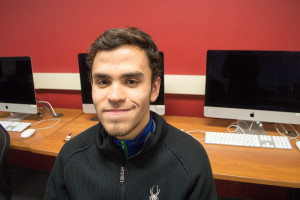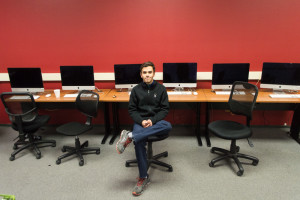Tags
Related Posts
Share This
Cross Culture: Manuel Barrios
As the fall semester winds down and students prepare for the holidays, Manuel Barrios, a sophomore film student at Santa Fe University of Art and Design, sits down with Jackalope Magazine to talk about his hometown of Caracas, Venezuela, where there aren’t many options for studying film. He applied to four different schools in the US and picked SFUAD because he felt as though the smaller student body would help him make friends quickly. He says he’s enjoying himself so far even if the cold weather isn’t his cup of tea.

Sophomore film student Manuel Barrios is thriving at SFUAD’s film school and aims to pursue directing. Photo by Jennifer Rapinchuk.
Why did you choose film?
I want to do film because I want to tell stories with the camera. I want people to be able to relate it to their lives and I want to leave a message at the end of each film. For example, messages about problems around the world and how to solve them, or messages with happy endings saying, ‘you can do whatever you want.’ When I was young, I thought film was just going to the movie theater and watching film, then I realized that the film industry is a lot bigger than that and wanted to study it. I’ve wanted to do film since I was 12.
What was your first impression of America?
I really don’t remember, but when I was growing up and I went to Florida I realized that some people are nice and some are not. The thing that I really noticed is that in my country, when you know a girl you can kiss her on the cheek, but in America it’s just a hug and that’s it. There are different ways to greet each other. I’m used to it now because I’ve been here for a while.
What is it like to be here during the holidays?
We don’t celebrate Thanksgiving [in Venezuela], but this is my second Thanksgiving and it was really cool. I ate a lot of turkey and mashed potatoes and it was good. I miss food from Venezuela; for Christmas we have two dishes that I really like. Hopefully I can eat them when I see my family again.
Is film taken seriously in Venezuela?
Yeah, I think so. Every year there are at least two films from my country that are released and that’s good. Throughout the years, the film in my country has been growing. There’s a director that I really like [Marcel Rasquin] who made a film called “Hermano,” or “Brother” in English and it won various awards. There are some differences between film in Venezuela and the US…for example, the films in my country portray the everyday lives of the poor people in my country, and with American films there are different genres like action, comedy. I think there are a lot of things that are similar, though.

Originally from Venezuela, Sophomore Film Student Manuel Barrios looks forward to spreading positive messages with his work, including his anticipated documentary about his home country. Photo by Jennifer Rapinchuk.
Have you made any movies about your hometown?
Not yet, but I would like to. Right now I am working on a treatment for a documentary that I want to make about the situation in my country. Right now we have a corrupt president and there are a lot of criminals, inflation and no food. People have to wait in huge lines to buy food. Let’s say it’s your turn and you enter the supermarket, there may be nothing left.
With all of the political happenings around the world, do you think it is important to interact with people from other counties?
I think that if you talk to a person about those things, you can give them advice on how to get through that problem or help them in any way possible, even by sharing articles about their country on social media.
Do you have any advice for other people from Venezuela who want to go to school for film?
|
My advice to them is to get out there and make films. Don’t worry if your film does not get good reviews at first. Keep making them and do not give up. One day hopefully you will get nominated for an Oscar!
|
This interview has been edited for style and clarity.






 Jackalope Magazine is the student magazine of Santa Fe University of Art and Design. Building on the interdisciplinary nature of our education, we aim to showcase the talent of our university and character of our city.
Jackalope Magazine is the student magazine of Santa Fe University of Art and Design. Building on the interdisciplinary nature of our education, we aim to showcase the talent of our university and character of our city.
Keep up Manuel, films are one of the best eays to reach people. Its an excellent media to express through images what often times is diffucult to convey with words. We are looking forward to your expressions about the situation in our country. Eventhough away from the motherland, we take it with us wherever we are.